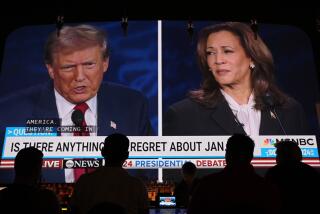In a Rigid Setting, Two Projections of the Father Image
- Share via
Who’s your daddy?
This seemed to be the question before America’s TV viewers, an hour into the first presidential debate Thursday night, when the intensely visceral and fear-producing issues of Iraq and Osama bin Laden and Saddam Hussein seemed to leave a choice between two father figures.
Who’s the daddy, at a time when the electorate is having nightmares about unseen, vaguely understood enemies? Is it President Bush, with his look-straight-into-the-camera, folksy masculinity, the daddy who pats you on the head, gives you a slogan that isn’t terribly helpful and keeps saying, though you’re not sure why, that life is “hard work”?
“I just know how this world works!” Bush said at one point, like a TV dad cutting off discussion at a dinner table.
Or is it the patrician-looking Kerry, who during this campaign has suffered from an innate reserve and the withering spin of the Bush people that he’s a waffler? Standing next to, or at least 10 feet from, Bush, he actually came across on TV as with-it, engaged and informed -- a father who might actually know best.
“I don’t know if he sees what’s really happening there,” Kerry said of Bush’s take on Iraq, on a night when anyone watching the evening news had seen tough footage of wounded and dead Iraqi children, victims of yet another car bombing in Baghdad.
Pundits had said all along that the debate could be a context in which Kerry would enjoy an advantage, though not a turn-the-campaign-around edge. When moderator Jim Lehrer announced the candidates, Bush came striding out first, easily beating Kerry to center stage.
On the “CBS Evening News,” anchor Dan Rather referred to the debate as a “televised happening.” He was referring to the imposed rigidities (no direct questions from the candidates, no pie charts, no sighing or hint of a human emotion) that threatened to turn the debate into two respective stump speeches delivered 10 feet apart.
But there were fireworks almost immediately, because the war in Iraq is an emotional, in-the-moment issue on which Kerry and Bush differ deeply. If it was shocking to see their differences on display so starkly, this has much to do with the shoddy way TV news has been covering the campaign, funneling every day into a headache-producing prism of 10-second sound bites, illuminated by nothing deeper than spin.
Bush came across as suddenly less qualified to be Daddy than he has been.
Bush did look into the camera as much as he did at moderator Jim Lehrer, which reinforced his personableness in contrast to Kerry’s more studied manner.
But words continually fail Bush. Mostly because he doesn’t try very many. With the TV cameras trained on the stripped-down debate stage, his bare-bones communication style sometimes played as monotonous rather than resolute. He repeatedly said the situation in Iraq was “hard work.” He said it 10 times, until it no longer seemed like anything so much as a network time-killer. He said this: “I wake up every day thinking about how best to protect us. There’s a lot of people working hard.”
Meanwhile, the candidates had signed an agreement requesting that TV cameras not show one while the other was speaking.
But the networks immediately violated this, posing the two in split screen. When Kerry spoke, Bush appeared tight-mouthed and frustrated that he was being contradicted. Kerry looked in control, taking notes, nodding and listening.
The two campaigns have crystallized their rhetoric about character: Inconsistency versus rigidity.
But on TV, rigidity made for a more revealing visual.
For 90 minutes, at least, it seemed Kerry had found a small-screen context in which he can get the better of Bush.
Even on the subject of actual fatherhood.
When Kerry said he had chuckled at some of the Bush daughters’ “comments,” Bush replied, “I’m trying to put a leash on them.” Kerry winked and said, “Well, I don’t know. I’ve learned not to do that, Mr. President.”
More to Read
Get the L.A. Times Politics newsletter
Deeply reported insights into legislation, politics and policy from Sacramento, Washington and beyond. In your inbox twice per week.
You may occasionally receive promotional content from the Los Angeles Times.










